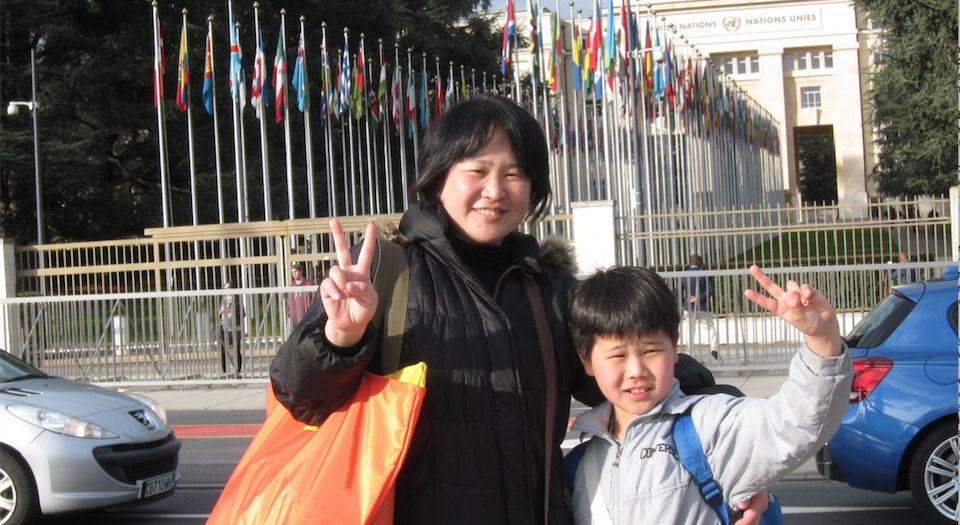by

Evacuees from nuclear disaster urge the Japanese government to comply with UN Human Rights standards
By Linda Pentz Gunter, with contributions from Kurumi Sugita and Akiko Morimatsu
When Kazumi Kusano stood in the CRIIRAD radiological laboratory in Valence, France listening to lab director, Bruno Chareyron, describe just how radioactive the soil sample taken from a school playground back home in Japan really was, she could not fight back the tears.
“This qualifies as radioactive waste,” Chareyron told them. “The children are playing in a school playground that is very contaminated. The lowest reading is 300,000 bequerels per square meter. That is an extremely high level.” (CRIIRAD is the Commission for Independent Research and Information about Radiation, an independent research laboratory and NGO).
Kazumi, a Japanese mother and Fukushima evacuee who prefers not to use her real name, was in France with two other mothers, Mami Kurumada and Akiko Morimatsu — all of whom also brought their children — as part of an educational speaking tour. Morimatsu was also invited to testify before the UN Commission on Human Rights in Geneva, to launch an appeal for the rights of nuclear refugees.
In Japan, seven years since the March 2011 Fukushima nuclear disaster began to unfold, the government is requiring some refugees to return to the region. Says Chareyron, whose lab has worked extensively in the Fukushima zone, “the Japanese government is doing everything to force citizens to return to lands where the radiation doses that citizens and children should be subjected to are largely over the typically acceptable norms.”

Kazumi Kusano, Akiko Morimatsu and Mami Kurumada (l to r) and Morimatsu’s two children during their speaking tour in France
“People in Japan still don’t believe that the effects they are feeling are due to radiation,” said Kusano during one of the tour stops in France. Indeed, when they took samples in their neighborhoods to be analyzed for radioactive contamination, they were mocked not only by their neighbors but by government officials.
“We don’t take this seriously in Japan,” said Kurumada, who expressed relief to be among those who understand the true dangers, like Chareyron and the French anti-nuclear activists with whom they met. “In our country, it’s taboo to talk about radiation and contamination.”
Both Kusano and Kurumada are among those who have brought lawsuits against Tepco and the Japanese government, seeking compensation for Fukushima evacuees. Several of these have already ruled in favor of the evacuees and have assigned responsibility for the accident to Tepco and the government while providing financial awards to the plaintiffs. (Kusano’s son’s testimony helped win one of those cases — see our earlier coverage.)
The Japanese government pressured evacuees to return to areas contaminated by the Fukushima disaster by withdrawing their government financial assistance. However, many in areas that were not obligatory evacuation zones also left the region, given the high levels of radioactive contamination.
In addition to the visit to CRIIRAD, the mothers also spoke at public meetings in Lyon, Grenoble and Valence where CRIIRAD is located. The short news video below, in French, captures their visit to the lab.
At the UN in Geneva, Morimatsu’s testimony was postponed several days by a workforce strike. But eventually, Morimatsu (pictured with her son above the headline) was able to deliver her speech. She said:
“My name is Akiko Morimatsu. I am here with other evacuees and mothers, together with Greenpeace. I evacuated from the Fukushima disaster with my two children in May 2011. Shortly after the nuclear accident, radiation contamination spread. We were repeatedly and unnecessarily exposed to unannounced radiation.
“The air, water and soil became severely contaminated. I had no choice but to drink the contaminated water, to breast-feed my baby. To enjoy health, free from radiation exposure, is a fundamental principle. The Japanese Constitution states, ‘We recognize that all peoples of the world have the right to live in peace, free from fear and want.’
“However, the Japanese government has implemented almost no policies to protect its citizens. Furthermore, the government is focusing on a policy to force people to return to highly contaminated areas.
“I call on the Japanese government to immediately, fully adopt and implement the recommendations of the UN Human Rights Council. I thank UN member states for defending the rights of residents in Japan. Please help us protect people in Fukushima, and in East Japan, especially vulnerable children, from further radiation exposure.”
Earlier that month, the Japanese government had responded to its Universal Periodic Review, by stating that it “supports” 145 recommendations and “notes” 72. One of those recommendations from the UN Human Rights Council, and which Japan “accepted”, was the paragraph that states: “Respect the rights of persons living in the area of Fukushima, in particular of pregnant women and children, to the highest level of physical and mental health, notably by restoring the allowable dose of radiation to the 1 mSv/year limit, and by a continuing support to the evacuees and residents (Germany);”
According to Hajime Matsukubo of Citizens Nuclear Information Center in Tokyo, while the Upper House of the Japanese Diet has indicated its willingness to decrease annual radiation exposures from 20 mSv, the Japanese government has only said it would “follow up” on the specific UN recommendation and report back later. There is no timeframe for such a change, hardly surprising since it would presumably mean once more evacuating people the government has already pressured to return to contaminated areas. The practical implications of this happening leave it very much in doubt.
However, Matsukubo believes that even the commitment to follow up “is a strong tool for us to push the government forward.” Aileen Mioko Smith of Kyoto-based Green Action agrees. “Now we have terrific leverage,” she said. Her group, along with Greenpeace Japan will be looking to “keep the Japanese government’s feet to the fire on this.”

Leave a Reply